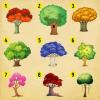
Portuguese activity, focused on eighth grade students, addresses the intensity adverbs. Let's analyze those expressions that modify the meaning of verbs, adjectives or adverbs, indicating intensity? To do this, answer the questions based on the text about the Yellow Ipe!
This Portuguese language activity is available for download in an editable Word template, ready to print in PDF and also the completed activity.
Download this Portuguese exercise at:
SCHOOL: DATE:
PROF: CLASS:
NAME:
Read:
Dear friends, I am very feminine and beautiful. Ah, that's what they say out there, right? I have this name Ipê-yellow, but I can receive other names. It all depends a lot on the color of the flowers that come from me. Scientists know me for Chrysotricha Tabebuia.
I am considered the symbol tree of Brazil. My great friend Pau-brasil is the national tree.
My wood is widely used for the manufacture of posts, wooden floors, frames, etc. But what I have the most attention is my flowers. They are really beautiful and give life and color to the landscape, you know?
Available in:. (With cut).
Question 1 - In the sentence that introduces the text, there is an adverb of intensity. Point it out:
( ) "good"
( ) "feminine"
( ) "pretty"
Question 2 - The term underlined plays the role of an adverb of intensity in the passage:
( ) “I have this name Ipê-yellow, but I can be given other names.”
( ) “But what do I have to more what draws attention are my flowers."
( ) "They are really beautiful and give life and color to the landscape, you know?”
Question 3 - In the passage identified above, the adverb intensifies the meaning of:
( ) a verb
( ) an adjective
( ) an adverb
Question 4 – In the sentence “Everything depends a lot on the color of the flowers […]”, the adverb “a lot” adds the circumstance of intensity to a verb:
( ) binding
( ) intransitive
( ) indirect transitive
Question 5 - In the segment “My wood is often used to make posts […]”, the intensity adverb “very” modifies the meaning of a verb:
( ) in infinitive form.
( ) in the form of a gerund.
( ) in the form of a participle.
Per Denyse Lage Fonseca – Graduated in Languages and specialist in distance education.
At answers are in the link above the header.
 report this ad
report this ad